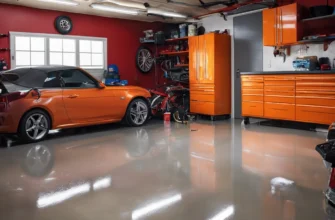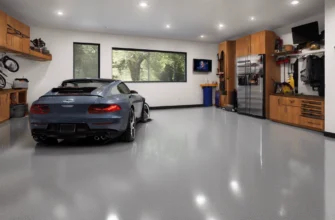- Introduction to Epoxy Garage Flooring
- Curb Appeal and First Impressions
- Durability and Maintenance Benefits
- Increased Home Value: What the Numbers Say
- Eco-Friendly Options and Energy Efficiency
- Cost Considerations and ROI
- Installation Process: What to Expect
- Customer Testimonials: Real-Life Experiences
- Conclusion: Is Epoxy Garage Flooring Right for You?
Introduction to Epoxy Garage Flooring
Epoxy garage flooring has gained significant attention among homeowners seeking to enhance the functionality and aesthetic appeal of their garages. Essentially, epoxy is a resinous compound made from a mixture of polymer and hardener, which, when applied to concrete floors, creates a robust and long-lasting coating. The properties of epoxy make it an ideal choice for garage flooring, offering protection and a polished look that can elevate the entire space.
The composition of epoxy flooring typically includes a base resin, an activator, and additional fillers that enhance its durability and aesthetic qualities. When applied correctly, epoxy cures to form a seamless, non-porous surface that resists stains, chemicals, and spills, making it particularly advantageous for garages, where oil and automotive fluids are common. This durability, combined with the ability to withstand heavy foot traffic and machinery, makes epoxy flooring a wise investment for homeowners looking to increase their property’s lifespan.
Beyond its functional advantages, epoxy garage flooring also offers a significant boost in aesthetic appeal. Available in a variety of colors and finishes, such as metallic, flake, or solid colors, homeowners can customize their garage to suit their personal style and preferences. This versatility allows for a more polished and uniform appearance, which can have a positive impact on a home’s overall marketability. An attractive garage space is often viewed as a valuable asset, contributing to a positive first impression for potential buyers.
In summary, epoxy garage flooring stands out as a premier option for homeowners seeking both durability and style. Its composition and protective qualities not only enhance the garage environment but also contribute to the overall value of the home. As such, homeowners considering an upgrade should take into account the myriad benefits that epoxy flooring can offer.
Curb Appeal and First Impressions
The exterior appearance of a home plays a significant role in real estate, particularly regarding first impressions. Curb appeal can strongly influence potential buyers, and one effective way to enhance this aspect is through upgraded garage flooring, specifically epoxy coatings. An attractive, well-maintained garage creates an inviting atmosphere and serves as a reflection of the overall upkeep of the property. Buyers often draw conclusions about a home’s condition based on visible features, including the garage, making it essential to invest in improvements such as epoxy flooring.
Epoxy garage flooring enhances the aesthetic value of a garage significantly. These coatings offer a clean, glossy finish that not only elevates the visual appeal but also provides a durable barrier against stains, chemicals, and wear. This level of upkeep can convey to prospective buyers that the home has been cared for, both inside and out. A well-finished garage can quickly shift the perception from a mere storage space to an organized and multipurpose area, heightening its appeal during showings.
Durability and Maintenance Benefits
Epoxy garage flooring is renowned for its exceptional durability, distinguishing it significantly from traditional flooring options such as concrete or tiles. One of the primary benefits of epoxy is its ability to withstand heavy loads, making it an ideal choice for garages that house vehicles, tools, and equipment. The epoxy resin used in flooring creates a tough surface that is not only resistant to cracking and chipping but also provides a seamless finish that eliminates joints where dirt and grime can accumulate. This material’s resilience extends to its capacity to resist stains and spills, often encountered in garage environments, including oil, chemicals, and common household substances.
Maintenance is streamlined with epoxy flooring, requiring minimal effort compared to traditional materials. Regular sweeping and occasional mopping with a mild detergent are usually sufficient to keep the surface clean and presentable. Unlike other flooring types that may require waxing or sealing to maintain their appearance and functionality, epoxy flooring typically maintains its sheen and integrity over time, negating the need for extensive upkeep. This low-maintenance requirement not only saves homeowners time but also reduces long-term costs associated with flooring repair or replacement.
The wear and tear that can affect standard garage floors is significantly diminished with epoxy. Its ability to resist chipping and fading ensures that the flooring retains its aesthetic appeal for years to come, thus adding to the overall value of the home. Beyond aesthetics, this longevity contributes to a safer environment, as a well-maintained floor can reduce slip hazards caused by accumulated debris or spills. Ultimately, the durable nature and ease of maintenance make epoxy garage flooring a wise investment for homeowners seeking to boost their property value and ensure the longevity of their garage space.
Increased Home Value: What the Numbers Say
Investing in epoxy garage flooring has been increasingly recognized as a savvy decision for homeowners looking to enhance the value of their properties. Numerous studies and real estate experts indicate that such upgrades can yield substantial returns. For instance, a study by the National Association of Realtors highlighted that a well-maintained garage can boost a home’s overall value by approximately 5% to 10%, depending significantly on the local market conditions.
In terms of hard numbers, home improvements tailored towards functionality and durability, such as upgrading to epoxy flooring, often present a remarkable cost-to-value ratio. According to Remodeling Magazine’s Cost vs. Value report, homeowners can expect up to a 75% return on investment (ROI) for garage flooring upgrades. This statistic is particularly relevant in areas where curb appeal and interior upgrades are prioritised by potential buyers.
Real estate agents affirm that properties with immaculate garages equipped with high-quality flooring can appeal more significantly to buyers. In interviews, agents have noted that homes showcasing epoxy flooring not only attract more interest during showings but also frequently sell for higher prices—sometimes up to $15,000 more than comparable properties lacking such enhancements.
Moreover, the increasing trend among buyers prioritizing low-maintenance features plays a pivotal role in this phenomenon. Epoxy flooring, known for its durability and ease of upkeep, resonates well with prospective buyers looking for long-lasting options, which in turn helps sway their purchasing decisions. Thus, the installation of epoxy garage floors is not merely a matter of aesthetics; it is firmly anchored in tangible benefits that positively influence home value.
Eco-Friendly Options and Energy Efficiency
Modern epoxy garage flooring has evolved significantly, with a strong emphasis on sustainability and eco-friendliness. One key factor that contributes to this advancement is the development and use of low VOC (volatile organic compounds) substances. These low VOC options not only reduce harmful emissions into the environment but also improve indoor air quality. This is particularly important for garages, where fumes from vehicles and other materials can accumulate. Homeowners looking to enhance their property’s appeal to environmentally conscious buyers can benefit substantially from these eco-friendly solutions.
Additionally, epoxy flooring can be formulated with sustainable materials that minimize the impact on the environment. Manufacturers are now introducing recycled and bio-based options, allowing for a more sustainable approach to home improvement. By choosing these environmentally friendly epoxy solutions, homeowners can showcase their commitment to sustainability, which is an increasingly important factor for many buyers in today’s market.
Energy efficiency in the garage also plays a significant role in boosting home value. A well-installed epoxy floor can improve the garage’s insulation properties, helping regulate temperature fluctuations. This can lead to reduced energy costs for heating or cooling adjacent living spaces, adding further appeal to potential buyers who prioritize energy efficiency. Moreover, the high reflectivity of epoxy floors can enhance lighting in the garage, reducing the need for additional lighting fixtures and thus further conserving energy.
By investing in eco-friendly epoxy garage flooring, homeowners not only contribute to environmental sustainability but also potentially increase their property’s marketability. In a real estate landscape where energy efficiency and low environmental impact are becoming increasingly valued, these modern epoxy flooring options present a strategic approach to enhancing home value.
Cost Considerations and ROI
When evaluating the decision to install epoxy garage flooring, one must contemplate not only the initial costs but also the potential return on investment (ROI). Epoxy flooring typically ranges from $3 to $12 per square foot, depending on factors such as preparation, complexity of the design, and the quality of the materials used. In contrast, traditional concrete flooring is often more affordable, usually costing between $2 to $6 per square foot, but it lacks the durability and aesthetic appeal of epoxy solutions.
Despite the higher upfront expenditure associated with epoxy flooring, several benefits may justify this cost. For instance, epoxy provides a long-lasting and low-maintenance surface resistant to spills, stains, and wear. This durability can save homeowners money over time, as it reduces the frequency of repairs and replacements. Additionally, the glossy finish of epoxy flooring enhances the visual appeal of a garage, potentially making it a more attractive feature for prospective buyers.
The ROI from installing epoxy garage flooring manifests itself not only in the aesthetic elevation of the space but also in the practical enhancements it offers. Real estate experts suggest that homes with upgraded garages can see a significant increase in overall home value, potentially recouping as much as 70% to 80% of the initial investment when reselling. Factors influencing this return include the current housing market trends, the extent of other renovations made to the property, and the individual buyer’s preferences.
In terms of timing, homeowners looking to sell soon after installing epoxy flooring may notice the positive impacts within a few months to a year. A visually appealing and functional garage can differentiate a property in a competitive market, thereby enhancing its appeal to potential buyers.
Installation Process: What to Expect
Installing epoxy garage flooring is a meticulous process that requires careful planning and execution to achieve optimal results. The procedure typically involves several stages, ranging from surface preparation to the application and curing of the epoxy. Before commencing, an assessment of the current garage floor is essential to identify any necessary repairs or cleaning requirements. Cracks, oil stains, or excessive moisture must be addressed to ensure complete adhesion of the epoxy to the floor surface.
Once the surface is prepared, the next stage involves either professional installation or a DIY approach. Homeowners opting for a DIY method should invest time in researching the best practices for epoxy application. Although this can be a cost-effective solution, it is crucial to understand that improper application may lead to flaking or peeling, ultimately undermining the benefits of epoxy flooring. Conversely, hiring experienced contractors can help ensure a seamless finish, as they come equipped with the necessary tools and expertise.
The actual installation process generally takes a couple of days. Initially, the flooring surface is ground or etched to promote better adhesion. Following this, the primer is applied, which serves as a base layer for the epoxy. The epoxy mixture is then carefully spread across the surface using a roller or squeegee. Once applied, it typically requires about 24 to 48 hours to cure, depending on environmental conditions and the specific product used. During this curing period, it is advisable to avoid walking or placing heavy objects on the floor.
Lastly, homeowners must consider the potential disruptions that may arise during installation, particularly if utilizing the garage for daily tasks or parking. Planning ahead for these inconveniences will ensure a smoother transition to enjoying the benefits of a robust and aesthetically pleasing epoxy garage floor.
Customer Testimonials: Real-Life Experiences
Homeowners who have decided to upgrade to epoxy garage flooring often share transformative experiences that not only enhance the aesthetic appeal of their garages but also add substantial value to their homes. Take the case of Sarah, a homeowner from Colorado, who was motivated by the need for a durable and easy-to-maintain surface in her garage. After a thorough research process, she opted for epoxy flooring and remarked how the installation process was seamless. “The team was professional and completed the work in a timely manner. I was surprised at how quickly we were able to enjoy our new garage,” she stated. This seamless transition underscores the importance of proficient installation in realizing the full benefits of epoxy flooring.
Another homeowner, John from Texas, expressed his satisfaction by noting how the flooring added a level of sophistication to his garage. He elaborated, “I always thought of my garage as a utilitarian space, but after installing epoxy flooring, it feels like an extension of my home.” This sentiment reflects a broader trend among homeowners who are increasingly recognizing the value of well-designed spaces, even those not typically featured in home valuations. John’s comment highlights how the upgraded aesthetic can redefine a homeowner’s perception of space.
Furthermore, Amy from Florida reported an increase in inquiries about her home after she completed her epoxy flooring project. “I couldn’t believe it when potential buyers mentioned how much they loved the garage. It made a huge difference during showings,” she shared. This reveals how epoxy garage flooring not only improves the current living experience but can also significantly boost the property’s marketability. These testimonies illustrate that beyond aesthetics and durability, epoxy flooring serves as a strategic investment that can enhance both daily life and property value.
Conclusion: Is Epoxy Garage Flooring Right for You?
As individuals weigh the various options available for enhancing the appeal and functionality of their homes, epoxy garage flooring emerges as a notable contender. The advantages provided by this flooring solution are numerous, including its durability, resistance to chemicals, and aesthetic versatility. Homeowners looking for a flooring option that can withstand heavy use and potential spills may find epoxy to be particularly advantageous. Its non-porous surface limits the maintenance required over time, making it a practical choice for those who prioritize ease of care.
Moreover, the aesthetic appeal of epoxy flooring is another essential aspect to consider. With numerous color options, patterns, and finishes available, homeowners can tailor their garage floors to suit personal tastes and enhance the overall look of their property. The addition of epoxy flooring can significantly elevate the appearance of a garage, providing a polished and professional look that may subsequently improve overall property value. For those considering renovations, this flooring option holds potential, particularly in markets where curb appeal plays a critical role in property valuation.
However, it is equally important for homeowners to assess their specific needs before making a decision. Factors such as budget, intended use of the garage space, and personal style preferences will significantly influence whether epoxy garage flooring is a suitable investment. Additionally, addressing potential drawbacks, such as the necessary preparation and installation processes, can assist in determining the feasibility of making the upgrade.
Ultimately, evaluating the benefits of epoxy garage flooring against personal requirements and aesthetic aspirations will enable homeowners to make an informed choice that aligns with their property goals. Consider the unique aspects of your home and lifestyle to decide if this flooring solution can effectively boost both functionality and value.








